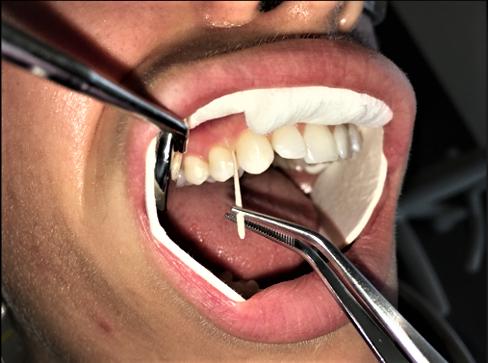Links to other health issues suggested

Credit: Dr. Shatha Bamashmous, University of Washington School of Dentistry
UW researchers reveal new aspects of gum disease and body’s protective response
SEATTLE – A team led by University of Washington researchers has, for the first time, identified and classified how different people respond to the accumulation of dental plaque, the sticky biofilm that gathers on teeth. Their work, recently published in the journal Proceedings of the National Academy of Sciences of the United States of America (PNAS), sheds important new light on why some people may be more prone to serious conditions that lead to tooth loss and other problems.
Left unchecked, plaque buildup can induce gingivitis, or gum inflammation. Gingivitis, in turn, can lead to periodontitis, a serious gum infection that damages the soft tissue and can destroy the bone that supports teeth. Not only can this result in tooth loss, but chronic inflammation can also spur other serious health consequences, including heart disease, diabetes, cancer, arthritis, and bowel diseases.
The researchers also found a previously unidentified range of inflammatory responses to bacterial accumulation in the mouth. When bacteria build up on tooth surfaces, it generates inflammation, a tool the body uses to tamp down the buildup. Previously, there were two known major oral inflammation phenotypes, or individual traits: a high or strong clinical response and a low clinical response. The team identified a third phenotype, which they called “slow”: a delayed strong inflammatory response in the wake of the bacterial buildup.
The study revealed for the first time that subjects with low clinical response also demonstrated a low inflammatory response for a wide variety of inflammation signals. “Indeed, this study has revealed a heterogeneity in the inflammatory response to bacterial accumulation that has not been described previously,” said Dr. Richard Darveau of the UW School of Dentistry, one of the study’s authors.
His School of Dentistry colleague and study co-author Dr. Jeffrey McLean said, “We found a particular group of people that have a slower development of plaque as well as a distinct microbial community makeup prior to the start of the study.” The study authors wrote that understanding the variations in gum inflammation could help better identify people at elevated risk of periodontitis. In addition, it is possible that this variation in the inflammatory response among the human population may be related to susceptibility to other chronic bacterial-associated inflammatory conditions such as inflammatory bowel disease.
In addition, the researchers found a novel protective response by the body, triggered by plaque accumulation, that can save tissue and bone during inflammation. This mechanism, which was apparent among all three phenotypes, utilizes white blood cells known as neutrophils. In the mouth, they act something like cops on the beat, patrolling and regulating the bacterial population to maintain a stable condition known as healthy homeostasis.
In this instance, plaque is not a villain. To the contrary, the researchers said that the proper amount and makeup of plaque supports normal tissue function. Studies in mice have also shown that plaque also provides a pathway for neutrophils to migrate from the bloodstream through the gum tissue and into the crevice between the teeth and gums.
When healthy homeostasis exists and everything is working right, the neutrophils promote colonization resistance, a low-level protective inflammatory response that helps the mouth fend off an excess of unhealthy bacteria and resist infection. At the same time, the neutrophils help ensure the proper microbial composition for normal periodontal bone and tissue function.
The researchers’ findings underscore why dentists preach the virtues of regular brushing and flossing, which prevent too much plaque buildup. “The idea of oral hygiene is to in fact recolonize the tooth surface with appropriate bacteria that participate with the host inflammatory response to keep unwanted bacteria out,” Dr. Darveau said. The bacteria start repopulating the mouth’s surfaces spontaneously and almost immediately afterward, he said.
###
This research was part of a PhD thesis by Dr. Shatha Bamashmous, a clinician scientist in Dr. Darveau’s laboratory, and was conducted by a team researchers that included Dr. McLean, co-communicating author and colleague in the UW School of Dentistry’s Department of Periodontics; Dr. George Kotsakis of the University of Texas Health Science Center and formerly a UW Department of Periodontics member; Kristopher Kerns of the UW dental school’s Department of Oral Health Sciences; Dr. Brian Leroux, a biostatistician with the school’s Department of Oral Health Sciences; and Dr. Camille Zenobia, Dr. Dandan Chen, and Dr. Harsh Trivedi of the Colgate-Palmolive Company’s Department of Oral Health Research.
Media Contact
Steve Steinberg
[email protected]
Original Source
https:/
Related Journal Article
http://dx.




